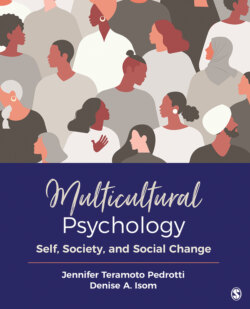Читать книгу Multicultural Psychology - Jennifer T. Pedrotti - Страница 18
На сайте Литреса книга снята с продажи.
Impact in Everyday Life
ОглавлениеWe may also experience this lack of attention to cultural context in everyday life, when someone assumes that behaviors that align with various non-Western cultural norms are “wrong” when they differ from those that the majority culture believes is the “right way” of behaving. Leadership is one area in which the White Standard is often applied (Rosette, Leonardelli, & Phillips, 2008). Consider the following vignette:
I am very good at my job and I know that my efforts were a huge part of our team succeeding in our last project. My boss knows this too. At our last large group meeting he gave me some praise and said that I was “solely” responsible for the success. I deferred a little in the meeting because I wanted to give my team credit too and talked about this as a joint effort. I’m Chinese American and was taught from a young age to share the credit whenever I can. It seems like the right thing to do to as a leader. Later my boss called me into his office and said he’d like to offer me some advice. He said, “If you want to keep moving up in this business you have to take credit when it’s offered to you and not give it away. That’s not the style of a good leader. I’d like to promote you eventually, but you’ll need to work on that weakness.” I felt confused because I know he knows that I did the work, but to me it’s not weak to acknowledge the others and share the credit. Instead, I think of this as the right thing to do.
—Anna, age 30
iStock/shapecharge
Here, Anna is using a tactic that is a strength and a marker of a good leader in her cultural background (sharing the wealth), but that same trait is viewed negatively by the mainstream White culture of which her boss is a part. As a result, Anna is seen as having a deficit. This is an example of the impacts of a deficit model in everyday life.
